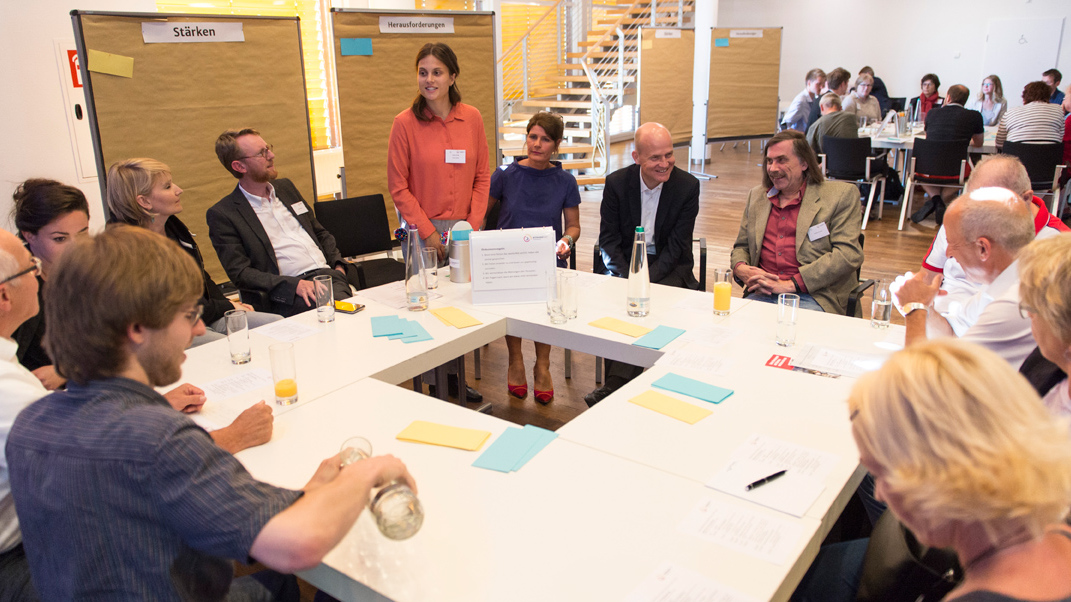Citizens' assemblies in the North and West

The German states of North Rhine-Westphalia (NRW) and Schleswig-Holstein will soon have citizens' assemblies at the state level. The coalition governments of the CDU and the Greens in the two federal states have enshrined this in their coalition agreements.
"In order to be able to include different perspectives in political decision-making processes, we will set up two citizens' assemblies on selected topics that represent society and test this instrument at the state level," reads the agreement of the CDU and the Greens in NRW. The necessary funds will be made available for the organisation and implementation of the citizens' councils.
Legal anchoring of citizens' assemblies
"We will anchor citizens' assemblies in law at the municipal level and at the state level," reads a succinct statement by the CDU and the Greens in the northernmost federal state.
Even before the state elections in North Rhine-Westphalia on 15 May 2022, the SPD, FDP and Greens had spoken out in favour of state-wide citizens' assemblies. The CDU, on the other hand, had rejected citizens' assemblies at the state level in its response to an enquiry by the association "Mehr Demokratie".
"Citizens' Assembly on selected future issues"
In an online event organised by Mehr Demokratie on 21 March 2022, the CDU member of the state parliament Björn Franken expressed the opposite view: "We think the instrument is basically good. There are already many examples. It depends on how it is designed."
The Greens had announced in their election manifesto that they wanted to convene "citizens' assemblies on selected issues for the future". Experiences from the federal government and other states show that citizens' assemblies are strong in finding constructive solutions through dialogue. The state parliament is to deliberate on the recommendations drawn up by citizens' assemblies.
Broad support in Schleswig-Holstein
There is broad support for citizens' assemblies in Schleswig-Holstein. Before the state elections on 8 May 2022, candidates from the CDU, SPD, Greens, FDP and SSW spoke out in principle for randomly selected citizens' assemblies in the coastal state at an event organised by Mehr Demokratie.
According to the Green Party's election manifesto, citizens' assemblies should create the possibility of involving citizens more directly in politics and legislation on selected issues. Citizens' assemblies are to be anchored in law at the state and municipal level. It should be possible to convene them by resolution of the state parliament and the municipalities as well as by popular initiative or citizens' petition.
Citizens' assemblies in other coalition agreements
"The government and parliament or the local councils have to deal with the results, but not follow them. If they do not follow the proposals, the initiators of a preceding citizens' initiative or citizens' petition can demand that a referendum or citizens' petition be held on the results of the citizens' assembly," the Greens had proposed.
Coalition agreements on citizens' assemblies had previously been reached in Baden-Württemberg, Rhineland-Palatinate and Thuringia.
Citizens' forums in Baden-Württemberg
In Baden-Württemberg, the Greens and the CDU want to open up state and local politics to a broad application of sortition procedures. In their coalition agreement agreed in 2021, both parties announce corresponding reforms.
There are to be "citizens' forums with random citizens" on important draft laws. In the state constitution, "bridges are to be built between direct democracy and dialogue-based citizen participation - and thus between citizens and members of parliament". The Greens and the CDU want to expand the popular petition, for example. Up to now, such a motion has made it possible for parliament to deal with an issue. The extension should first make it possible for a citizens' forum with randomly selected citizens to be held at the Landtag. The latter should be able to adopt, adapt or reject the proposals.
Linking citizens' assemblies and referendums
At the municipal level, the participation of randomly selected citizens in local political decisions should take precedence over referenda. This could mitigate polarisation and promote mutual listening. Randomly selected citizens should also be able to have a say in the drawing up of development plans.
Almost at the same time, the coalition of SPD, FDP and Greens in Rhineland-Palatinate agreed to test citizens' assemblies in planning and change processes.
Citizens' assembly on citizen participation in Thuringia
In Thuringia, the Left, SPD and Greens believe that the existing instruments of citizen participation need to be reviewed. Some of the previous instruments did not achieve the intended goals of effective participation and direct democracy. Therefore, citizens are to be directly involved in the review via citizens' assemblies.
Read more